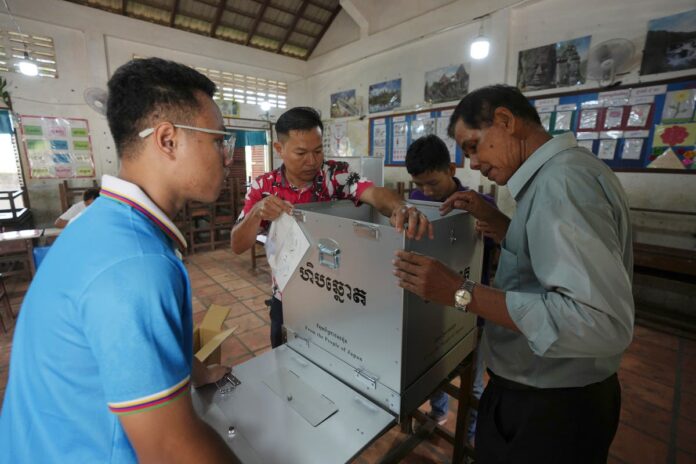Cambodians go to the polls Sunday with incumbent Prime Minister Hun Sen and his party all but assured a landslide victory thanks to the effective suppression and intimidation of any real opposition that critics say has made a farce of democracy in the Southeast Asian nation. The longest-serving leader in Asia, Hun Sen has steadily consolidated power with his strongarm tactics over the last 38 years. But, at age 70, he has suggested he will hand off the premiership during the upcoming five-year term to his oldest son, Hun Manet, perhaps as early as the first month after the elections. Hun Manet, 45, has a bachelor’s from the U.S. Military Academy at West Point as well as a master’s from NYU and a Ph.D. from Bristol University in Britain. He is currently chief of Cambodia’s army. Despite his Western education, however, observers don’t expect any immediate shifts in policy from that of his father, who has steadily drawn Cambodia closer to China in recent years. ‘I don’t think anyone expects Hun Sen to sort of disappear once Hun Manet is prime minister,’ said Astrid Noren-Nilsson, a Cambodia expert at Sweden’s Lund University. ‘I think they will probably be working closely together and I don’t think that there is a big difference in their political outlook, including foreign policy.’ Hun Manet is just part of what is expected to be a broader generational change, with the ruling Cambodian People’s Party planning to install younger leaders into most ministerial positions. ‘That’s going to be the big change of guard, that’s what I’m watching,” Noren-Nilsson said. “It’s all about the transition, it’s all about who’s going to come in and in what positions they find themselves.’ Hun Sen had been a middle-ranking commander in the radical communist Khmer Rouge responsible for genocide in the 1970s before defecting to Vietnam. When Vietnam ousted the Khmer Rouge from power in 1979, he quickly became a senior member of the new Cambodian government installed by Hanoi. A wily and sometimes ruthless politician, Hun Sen has maintained power as an autocrat in a nominally democratic framework. His party’s stranglehold on power faltered in 2013 elections, in which the opposition Cambodian National Rescue Party won 44% of the popular vote to CPP’s 48%. Hun Sen responded to the wake-up call by going after leaders of the opposition, primarily through sympathetic courts, which eventually dissolved the party after local elections in 2017 when it again fared well. Ahead of Sunday’s election, the Candlelight Party, the unofficial successor to the CNRP and only other contender capable of mounting a credible challenge, was barred on a technicality from contesting the polls by the National Election Committee. While virtually assuring another landslide victory for Hun Sen and his party, the methods have prompted widespread criticism from rights groups. Human Rights Watch said the ‘election bears little resemblance to an actual democratic process,’ while the Asian Network for Free Elections, an umbrella organization of almost 20 regional NGOs , said the National Election Commission had showed a ‘clear bias’ toward the CPP in barring the Candlelight Party. ‘Such disqualification further exacerbates the imbalanced and unjust political environment, leaving minimal room for opposition voices to compete on equal footing with the ruling party,’ the group said in a joint statement. ‘Moreover, the shrinking space available for civil society and the deliberate targeting of human rights defenders and activists raise serious alarm. The constriction of civic space undermines the active participation of civil society in the electoral process without fear of reprisal.’ After the ‘vastly unpopular’ way the opposition was neutralized in 2018, this time around there is little sign of widespread popular discontent, Noren-Nilsson said, because Hun Sen and the CPP have done a very effective job over the past five years of building a sense among many Cambodians that they are part of a new national project. The strategy has involved careful messaging, with sweeping slogans like ‘small country, big heart,’ and little talk about policy, she said. ‘It’s really quite astonishing how the CPP has managed to gain at least acceptance for what we see now,’ she said. ‘If before people thought that the glass was half empty, now it’s half full, so you focus more on what you have than don’t have.’ With the Candlelight Party out of the running, the largest beneficiary of any anti-CPP vote will likely be FUNCINPEC, a royalist party whose name is an unwieldy French acronym for the National Front for an Independent, Neutral and Cooperative Cambodia. Founded in 1981 by Norodom Sihanouk, Cambodia’s former king, the party defeated the CPP in 1993 U.N.-run elections, but his son, Norodom Ranariddh, ended up having to agree to a co-prime ministership with Hun Sen. Today’s party president, Norodom Chakravuth, who returned from France to take control of the party a little over a year ago after the death of his father Norodom Ranariddh, told The Associated Press that his sights are more on the 2028 election but is hoping this time to possibly win one or two seats.
Hun Sen is the longest serving leader in Asia. He’s purged critics and is set to win Cambodian polls
Sourceindependent.co.uk
RELATED ARTICLES


